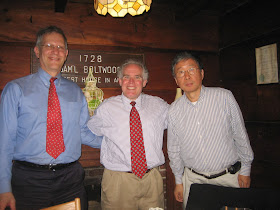Yesterday, at the Isenberg School of Management, we had the distinct pleasure of hosting Dr. Les Servi of MITRE, who is an INFORMS Fellow (and whom I have known since our days at Brown University as undergraduate students). Dr. Servi delivered a brilliant talk on his latest research on the topic: Analyzing Social Media Data Having Discontinuous Underlying Dynamics.
Dr. Servi's presentation was part of the UMass Amherst INFORMS Speakers Series, which the Student Chapter helps me to organize and to host.
His talk was on his paper in Operations Research Letters, just hot off the press, and published in the November issue.
The paper begins with the statement, which immediately captures your interest (as did his talk): Although physical objects follow well understood Newtonian physics and
are free of discontinuous dynamics, emotional intensity dynamics evolve
continuously with unknown dynamics until a tipping point or external
event triggers a discontinuity.
In his presentation, Dr. Servi asked whether anger has dynamics (the same about sadness and positive emotions). Is there a formula that can capture the anger of citizens and is there a momentum associated with anger? He concluded that sadness (and other emotions) follow dynamics that are different from those of rockets since there are discontinuities. His paper not only presents a model for a more nuanced dynamic for emotions but also a dynamic programming algorithm to solve the associated optimization problem that identifies times of emotional discontinuities. He then
illustrated the new method for the analysis of mood shifts reflected in 380,000
Twitter messages related to one of the world’s most popular soccer
teams, Manchester United, during their 2011–12 season. He was impressed that so many in the audience at the Isenberg School knew of this team and its sport (a finance audience at a talk he gave in Boston did not recognize the team).
And what Dr. Servi discovered through analyzing the data was fascinating and not what one would expect immediately. The figure below displays the Mood Shift Analysis of the Twitter messages showing a breakpoint on 2/6/2012 and 5/14/2012.
The discontinuities in mood associated with certain dates were not due to wins or losses of one of the world's most popular sport franchises (and one student in the audience had been to Manchester games) but one marked the anniversary of the following event: the tipping point found on February 6, 2012, might be due, according to Dr. Servi, to it being the 54th anniversary of an airplane crash in Munich which killed 8 Manchester United players and 3 staff and injured 9 other players as well as the team manager. Among serious Manchester United fans this event and date are well known despite it happening so long ago.
With a great talk such as this, our minds just percolated with ideas and questions. I asked whether MITRE had applied for a patent since the possible applications from finance to politics were simply stunning and the answer was ,"Yes," -- see here. One of my colleagues, Dr. Ryan Wright, asked a question about acceleration, which I thought was really interesting -- for example, could the model and algorithm track herding/crowding behavior? Dr. Rod Warnick of our great Hospitality and Tourism Management Department also asked a great question about seasonality with reference to Google as did several of the students. My colleague, Dr. Senay Solak, continued the conversations.
The discussions lasted as time just flew by until close to 4 o'clock and I think the students from the Isenberg School and the College of Engineering that came as well as the faculty will never forget this talk. We thank Dr. Les Servi for the clarity and brilliance of his talk! The previous time that Dr. Servi spoke in our series was in the Fall of 2006 when he talked about tracking pirates (and that was even before such activities hit the news).
Special thanks also to Dr. Bruce Weinberg, the Chair of the Marketing
Department at the Isenberg School, and a social media star, and to Dr.
Weibo Gong of the Department of Electrical and Computer Engineering at
UMass Amherst, whose PhD advisor at Harvard University was Professor
Larry Ho (also Servi's advisor), who joined Dr. Servi and me for lunch
at the University Club.
After lunch, Dr. Servi and many others joined us in a celebration of the 3 awards that we received at the INFORMS conference in Minneapolis. The cake was delicious and the company simply wonderful with even Dr. Amir Masoumi joining us from Manhattan College.
What a great time to be an Operations Researcher living in an era with a proliferation of data. What information will the data reveal and what new discoveries?! And as Dr. Les Servi said, Philip Morse, a pioneer of Operations Research, would be very pleased.










